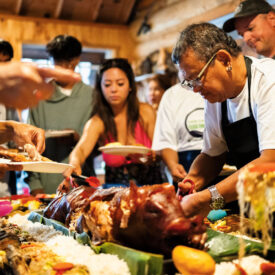
Lechon-Style Pork Belly
Barbecuing a whole pig is a lot. For a more manageable feast, try roasting pork belly—with a herb paste inspired by Philip's lechon—for a delicious balance of crisp skin and moist meat slow-roasted in its own rendered fat.
Ingredients
- 1.5 kg (3 lbs) skin-on pork belly
- 2 tsp salt
- 3 stalks lemongrass
- 1 small onion roughly chopped
- 6 green onions roughly chopped
- 6 cloves garlic roughly chopped
- 1 bunch mint stems removed (about 1 cup leaves)
- ½ tsp ground pepper
Instructions
- Using a sharp knife or a corn cob holder, poke pork belly skin all over—about 1 cm apart and about 5 mm deep.
- Bring about 1 cm of water to a simmer in a large frying pan. Place pork belly in pan, skin-side down, and simmer for 2 minutes. Transfer to a cutting board. Dry all sides with paper towel. Make a few cuts, about 1 cm deep and 2 cm apart, in flesh side. Rub salt into meat and skin.
- Refrigerate, skin-side up and uncovered, for up to 24 hours to help the skin crisp.
- Prepare lemongrass by removing tough outer leaves and trimming about 2 cm off the root end. Thinly slice about 15 cm of each stalk, stopping where the inner stalk becomes green and dry.
- In a food processor, pulse lemongrass, onion, green onions, garlic, mint, and pepper to make a rough paste. Spread paste over flesh side of pork belly.
- Place pork belly, skin-side up, on foil. Fold foil edges up and back, so sides are tightly covered but skin is exposed. Place skin-side up on a wire rack in a roasting pan, and cook in a 325°F oven until internal temperature reaches 175°F–185°F, about 3 hours. Reposition oven rack so the belly is about 8–10 cm from the broiler. Broil, turning the roasting pan frequently, until skin begins to puff slightly and brown. Remove and let rest for 10 minutes before serving.
- TO BARBECUE: Set up barbecue for indirect cooking and preheat to 325°F. Place foil-wrapped belly on unheated side and close lid. Cook until internal temperature reaches 175°F–185°F, about 3 hours. Flip pork belly, remove foil, and cook skin-side down over direct heat, until skin begins to puff and brown. Remove and let rest 10 minutes before serving.
Notes
The last few minutes of cooking the pork belly are the most critical; under the broiler, the skin can burn very easily. The same goes for the lechon, which is why Philip must constantly wipe the skin with water. “The Paculaba sisters are a tough bunch,” says Farah. “The skin has to be crisp and crackling.”
Tried this recipe?Let us know how it was!